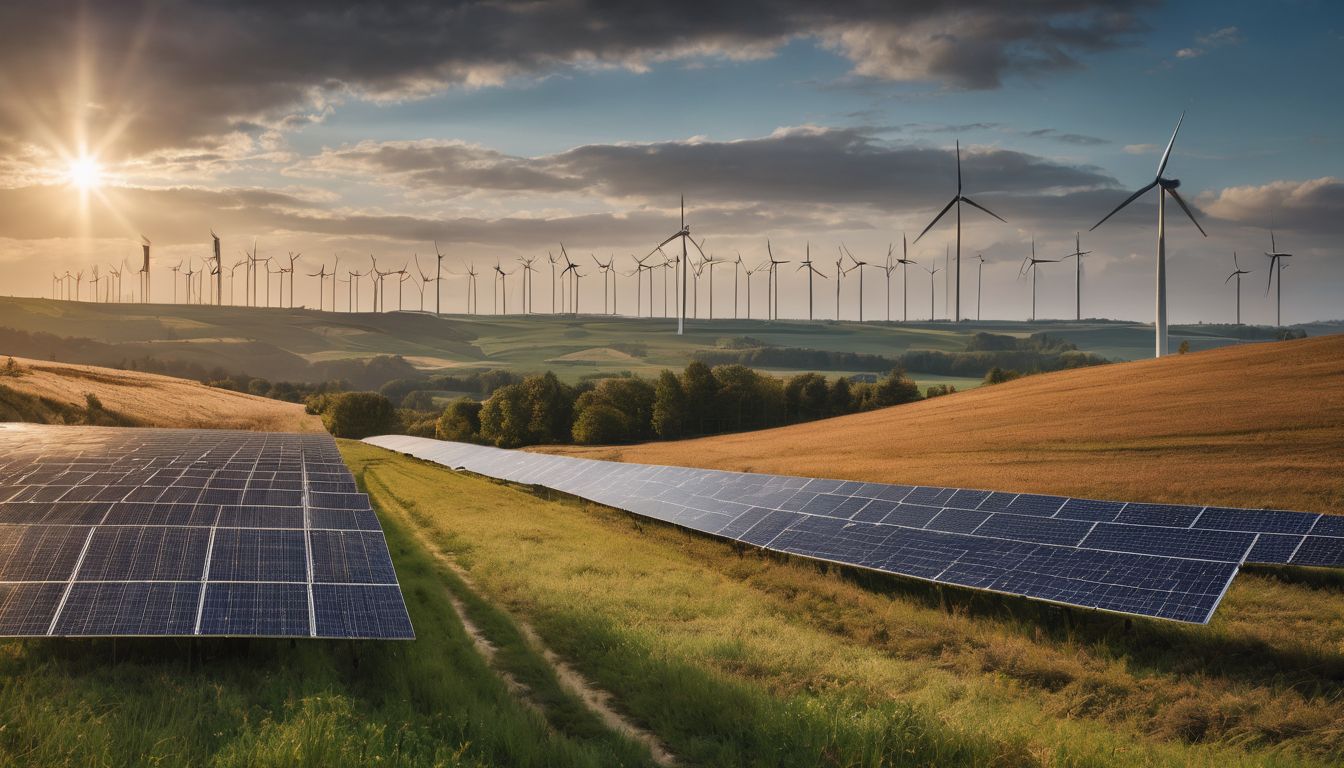Rising energy bills are troubling many UK households and businesses these days. In response, the government has unveiled a variety of grants and incentives to ease this financial pressure.
This article guides you through the maze of available options, helping you find financial support for making your home or business more energy-efficient. “Discover savings hidden in plain sight – continue reading!”.
Key Takeaways
- UK residents can apply for the Green Homes Grant, which covers two-thirds of certain energy-saving home improvements up to £5,000.
- Small and medium – sized businesses can get support from programmes like the Business Energy Efficiency Programme (BEEP) and Carbon Trust Grants to invest in energy efficiency.
- Low – income families have access to various aids such as the Cold Weather Payment and Warm Home Discount to help with winter heating costs.
- The government’s Renewable Heat Incentive encourages households and businesses to use renewable heat technologies through financial incentives.
- Households can improve their energy efficiency by taking advantage of grants like the Help to Heat scheme and Home Upgrade Grant (HUG).
Overview of Energy Grants in the UK
Energy grants and incentives in the UK are available to support businesses and homes in reducing carbon emissions, generating renewable energy, and lowering energy costs. There are various types of grants and incentives available, with different eligibility criteria and application processes.
Types of grants and incentives available
- Green Homes Grant: Homeowners can apply for vouchers to cover two-thirds of the cost of eligible energy-saving home improvements, up to £5,000.
- Renewable Heat Incentive (RHI): Encourages the use of low carbon heating systems by paying participants that generate and use renewable energy to heat their buildings.
- Energy Company Obligation (ECO): Obligates larger energy suppliers to assist households with energy-efficient methods such as insulation or heating upgrades.
- Feed-in Tariffs (FiT): Offers payments to individuals who generate their own electricity using renewable technologies like solar panels or wind turbines.
- Business Energy Efficiency Programme (BEEP): Provides assessments and grants to small and medium-sized enterprises for implementing business energy efficiency measures.
- Smart Export Guarantee (SEG): Replaces FiT by guaranteeing a payment for surplus renewable electricity exported back to the power grid.
- Carbon Trust Grants: Available for businesses investing in projects that reduce carbon emissions, including equipment upgrades and lean manufacturing processes.
- Low Carbon Workspaces: Offers funding up to £5,000 to SMEs making changes that cut greenhouse gas emissions or minimise waste production.
- Enhanced Capital Allowances (ECA): Businesses can claim 100% first-year allowances on qualifying energy-efficient plant and machinery investments.
- Climate Change Agreement (CCA): Sector associations can negotiate agreements with the government for reduced rates on environmental taxes in exchange for meeting energy efficiency targets.
- Clean Growth Financing Initiative (CGFI): Banks provide loans specifically tailored for investments in clean technology and green infrastructure projects.
How to find and apply for grants
Once you are aware of the types of grants and incentives available, it’s essential to know how to find and apply for them.
- Research government websites such as Gov.uk for up-to-date information on available grants and incentives.
- Contact your local council or energy supplier to enquire about any energy grant schemes they may offer.
- Utilise online search engines and databases specifically designed to help you locate relevant grants based on your criteria.
- Seek advice from professional energy assessors who can guide you through the application process and highlight suitable opportunities.
- Prepare all necessary documentation including proof of eligibility, bills, property information, and any other required forms.
- Complete the application process meticulously, ensuring that all relevant details are accurately provided.
- Keep track of your application status and follow up if necessary to ensure a timely response.
- Be proactive in seeking feedback on unsuccessful applications in order to improve future attempts.
Government Grants for Businesses
Businesses in the UK can access government grants to help reduce their carbon emissions, generate renewable energy, and lower their energy costs. These grants are aimed at supporting sustainable and eco-friendly practices within the business sector.
Reducing carbon emissions
Businesses can reduce their carbon emissions by investing in energy-efficient methods and generating renewable energy. Insulation grants, heating grants, and government subsidies support these initiatives.
By reducing reliance on non-renewable sources, businesses can contribute to a greener environment while lowering their operational costs.
Households can also play a crucial role in reducing carbon emissions by making energy-saving improvements. They may be eligible for insulation grants and heating grants to enhance the energy efficiency of their homes.
Generating renewable energy
Businesses can play a crucial role in reducing carbon emissions by generating renewable energy. This involves investing in solar, wind, or hydro power solutions to lower greenhouse gas emissions and move towards more sustainable operations.
By focusing on renewable investment and green energy sources, businesses can contribute to the overall reduction of carbon emissions while also benefiting from cost savings and energy efficiency improvements.
Homeowners can also take steps to generate renewable energy by utilising solar panels, heat pumps, or biomass boilers. These methods not only reduce reliance on traditional fossil fuels but also lead to long-term savings on energy costs.
Lowering energy costs
Government grants and incentives are available to help businesses reduce their energy costs. By implementing energy-efficient methods, businesses can lower their carbon emissions while benefiting from financial assistance.
Investing in renewable energy sources, such as solar panels or wind turbines, can also lead to long-term cost savings. Local schemes and rewards programs provide additional support for businesses looking to make energy-saving improvements.
For homeowners, the government offers various grants and initiatives to help lower energy costs. The Help to Heat scheme provides funding for insulation and heating upgrades, while the Home Upgrade Grant (HUG) supports the installation of energy-efficient measures.
Government Grants for Homes
The government offers various grants and incentives for homeowners to make energy-saving improvements, such as the Help to Heat scheme and the Home Upgrade Grant (HUG). Eligibility and application processes for these grants are relatively straightforward.
Help to Heat scheme
The Help to Heat scheme assists households in improving energy efficiency, reducing their carbon footprint, and cutting energy costs. It provides funding for insulation, draught-proofing, heating upgrades, and more.
Eligible homeowners can apply for the grant through energy suppliers or local authorities.
Households off the gas grid may also qualify for support under the Help to Heat scheme. This initiative aims to make homes warmer and more affordable to heat while contributing to environmental sustainability.
Home Upgrade Grant (HUG)
The Home Upgrade Grant (HUG) provides financial support for making energy-saving improvements to homes across the UK. Through HUG, eligible individuals can receive funding to upgrade their homes with more energy-efficient methods and reduce carbon emissions.
This grant aims to help households lower their energy costs while contributing to environmental conservation efforts by promoting off gas grid solutions and encouraging the use of renewable energy sources.
By participating in the Home Upgrade Grant program, homeowners have an opportunity to access valuable funding that supports initiatives aimed at reducing carbon emissions and increasing energy efficiency in residential properties.
Eligibility and application process
After learning about the Home Upgrade Grant (HUG), it’s important to understand the eligibility criteria and application process for accessing energy grants in the UK. Here’s a breakdown:
- Understand Eligibility: Assess if your household meets the income and property requirements for specific grants. Different programmes have different eligibility criteria, so it’s essential to check each one individually.
- Gather Required Documentation: Prepare necessary documents such as proof of income, property ownership, and utility bills to support your application.
- Submit Application Form: Fill out the application form accurately and provide all required information regarding your energy usage, current heating system, and any planned energy-saving improvements.
- Await Approval: Once you have submitted your application, await confirmation of approval from the relevant authority or organisation.
- Schedule Installation: If approved, schedule installation of any energy-efficient measures or upgrades covered by the grant.
- Fulfil Post-Installation Requirements: Some grants may require a follow-up inspection or submission of post-installation documentation to ensure compliance with grant conditions.
Benefits and Assistance for Low-Income Households
Government energy grants for low-income families are available to help with the costs of heating, energy-saving home improvements, and fuel vouchers. To find out more about these valuable resources for low-income households, keep reading!
Government energy grants for low-income families
Low-income families in the UK can access government energy grants to make their homes more energy-efficient and reduce their energy bills. These grants help cover the cost of insulation, heating upgrades, and renewable energy systems for eligible households.
By taking advantage of these incentives, low-income families can lower their carbon footprint, save on energy costs, and create a more comfortable living environment while contributing to environmental conservation efforts.
Furthermore, by providing financial support for energy-saving improvements, the government aims to ensure that all households have equal opportunities to adopt sustainable practices and benefit from reduced overall energy consumption.
Additional Support for Energy Bills
Low-income households can receive additional support for energy bills through programs such as Cold Weather Payment, Warm Home Discount, and the Priority Services Register. These initiatives help to alleviate the financial burden of high energy costs during challenging times.
Cold Weather Payment
The Cold Weather Payment helps eligible individuals stay warm during prolonged cold spells. This payment is made to recipients of certain benefits when the average temperature in their area falls to or below 0°C for seven consecutive days.
It provides financial support for heating costs, ensuring that vulnerable households can maintain a comfortable living environment during extreme weather conditions.
This initiative focuses on reducing energy-related health risks and preventing fuel poverty, aligning with efforts to promote energy-saving improvements and carbon reduction. Eligible recipients should be aware of this valuable support, which can make a significant difference in managing energy costs during challenging weather conditions.
Warm Home Discount
The Warm Home Discount is a government scheme that offers eligible households a one-off discount on their electricity bills during the winter. This initiative aims to help low-income families and vulnerable individuals cover the cost of keeping their homes warm during the colder months.
By providing financial support, the Warm Home Discount assists in reducing energy bills and ensuring that everyone has access to adequate heating, promoting energy efficiency and affordable warmth for those who need it most.
For environmentally conscious individuals looking to make a positive impact, understanding available assistance like the Warm Home Discount can be essential in supporting sustainable living and ensuring equitable access to energy resources.
Priority Services Register
Transitioning from support with energy bills to additional assistance, the Priority Services Register offers further help to those who need it. This service ensures that vulnerable individuals are given priority in case of a power cut and provides additional support with energy-related issues.
Being on this register can also mean getting advance notice of planned power outages and receiving tailored advice on managing energy usage.
Fuel vouchers
Fuel vouchers provide essential assistance to low-income households struggling with energy costs. These vouchers can be used to purchase gas, electricity, or even heating oil, helping families keep their homes warm and lit.
They are a valuable resource that eases financial strain and ensures access to vital energy supplies.
For those facing economic hardship due to high energy costs, fuel vouchers play a crucial role in promoting energy security and reducing the risk of fuel poverty. By offering this support, the government helps vulnerable households stay warm during winter months, contributing to overall well-being and comfort for families in need.
Energy debt assistance
Transitioning from assistance with fuel vouchers, individuals struggling with energy debt can find relief through various support programs. Low-income households facing energy debt can access financial aid and advisory services to manage their utility bills effectively.
Energy debt assistance empowers individuals to take control of their energy costs and make necessary adjustments to keep their homes warm and well-lit without experiencing financial strain.
Furthermore, by accessing these resources, households can avoid falling into further financial hardship due to overdue energy bills while also reducing the overall environmental impact.
Energy debt assistance extends a lifeline to those grappling with high utility bills, addressing both immediate financial concerns and long-term sustainability goals. By mitigating the burden of energy debts, individuals gain the opportunity to adopt more sustainable practices in managing their usage and enhancing home efficiency.
Energy-saving home improvements
Upgrade your home with energy-saving improvements to reduce your carbon footprint and lower utility costs. Consider installing energy-efficient windows, adding insulation, or upgrading to a smart thermostat for better control of heating and cooling.
These upgrades not only benefit the environment but also increase the comfort and value of your home.
Make simple changes like switching to LED bulbs, sealing air leaks around doors and windows, and maintaining efficient appliances to further enhance your home’s energy efficiency. With these improvements, you can enjoy a more sustainable lifestyle while saving money on monthly energy bills.
Other local energy grants and rewards programs.
Exploring beyond home improvements, here are some other local energy grants and rewards programmes offering support and incentives for environmentally conscious individuals.
- Community Energy Fund: Local schemes providing financial support for community-led renewable energy projects, such as solar panel installations or wind power initiatives.
- Green Rewards Programmes: Incentives offered by local councils or energy providers for households adopting sustainable practices, including recycling, reducing energy consumption, and using eco-friendly transportation.
- Climate Action Grants: Funding opportunities for community groups and organisations aiming to implement projects that mitigate climate change impact, promote energy efficiency, or advocate for environmental conservation.
- Energy Efficiency Rebates: Various regional programmes offering rebates on energy-efficient appliances, smart thermostats, insulation upgrades, and other measures that reduce overall energy consumption.
- Sustainable Transport Initiatives: Support for transitioning to low-emission vehicles, installing electric vehicle charging stations, and promoting cycling and walking infrastructure in local communities.
- Renewable Heat Incentive: Potential grants or tariff payments available regionally to encourage the use of renewable heat technologies in homes and businesses.
- Local Conservation Projects: Funding opportunities for nature reserves, wildlife habitats restoration, tree planting initiatives, and biodiversity conservation efforts in the local area.
Conclusion
In conclusion, the UK offers a variety of energy grants and incentives aimed at promoting energy efficiency and sustainability. Businesses can benefit from grants to reduce carbon emissions, generate renewable energy, and lower energy costs.
Homeowners also have access to schemes like the Help to Heat program and the Home Upgrade Grant (HUG). Low-income households receive additional support through government energy grants and assistance programs.
Lastly, there are various other local initiatives such as Cold Weather Payments, Warm Home Discount, Priority Services Register, fuel vouchers, and energy debt assistance available for those in need.
FAQs
1. What are energy grants and incentives in the UK?
Energy grants and incentives in the UK are financial supports provided to encourage individuals and businesses to adopt energy-saving improvements using energy-efficient methods.
2. How can I apply for these energy saving incentives?
You can apply through specific government or local council schemes designed for funding energy-efficient upgrades, often listed on their respective websites.
3. Are there benefits of using energy efficient methods at home?
Certainly! Using energy efficient methods at home not only reduces your utility bills but also qualifies you for various grants that support making such eco-friendly changes.
4. Who is eligible for receiving energy funding in the UK?
Eligibility depends on several factors like income, property type, and existing insulation; however, many programs offer assistance widely to promote widespread use of improved energy-saving techniques.





